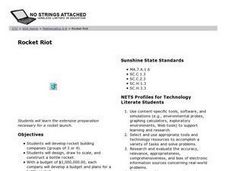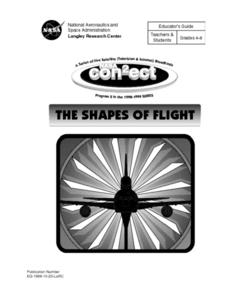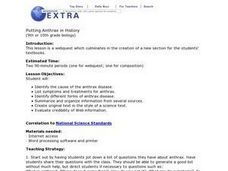Curated OER
Evaluating Potential Sources: Deciding What to Use and What to Reject
Teach young researchers how best to choose sources. This PowerPoint presentation underscores the need for accuracy, authority, objectivity, currency, and coverage.
Channel Islands Film
Human Impact on the Food Web of Santa Cruz Island
What happens when a non-native species is introduced onto an island? Santa Cruz Island, part of the Channel Island chain located off the coast of southern California, provides the perfect laboratory for young environmental scientists to...
It's About Time
Renewable Energy Sources - Solar and Wind
There has been a huge solar energy spill! Let's go outside to play in it. This lesson includes multiple experiments showcasing solar and wind energies. Scholars build a solar heater and an anemometer before testing the results. The...
Curated OER
Food Webs in the Barnegat Bay
Students investigate the food webs in the Barnegat Bay. In this organisms lesson, students use a graphic organizer to illustrate the types of consumers in the bay. Students use reference books to continue to research the animals found in...
Curated OER
Rainforest/Informational Web Sites that are Credible
Fifth graders evaluate whether various rainforest websites are credible and can be used for research purposes. They listen to the story "The Great Kapok Tree," discuss what makes a website credible, and examine and evaluate various...
Columbus City Schools
It’s Electric!
Shocking! Who knew so many great ideas existed for teaching middle schoolers about electricity? Find them all within this energetic framework. You'll light up at the variety of printable and web-based resources within! After building...
Curated OER
Fact or Fiction? Urban Legends and Misconceptions
High schoolers are introduced to a process for using web site resources to verify the accuracy of biology information. They follow a guided lesson on evaluating web sites and determining content accuracy. They select a piece of unusual...
Curated OER
Discovering New Species
Learners identify animals observed by Lewis and Clark while evaluating the animal's habitat and describing the animal's behavior. Students construct a food web mobile to illustrate the animal's position in the food web in the 19th...
Curated OER
Simple Machines
Have your class conduct research to learn all they can about simple machines. They use the web, take notes from a video, write a script, then make a film describing various simple machines found in real life. These videos are then...
Curated OER
Tracking down Good Information on the Web
Fifth graders brainstorm on whiteboard Web authorship and what they think they need to know about information on a website in order to judge its content. They research the solar system websites and present them to the class with their...
Curated OER
Energy Alternatives Explorations
In this energy alternatives explorations worksheet, students explore alternative energy sources by using the linked web resources to answer 8 questions about different resources and identify the ones that would work in their community.
NOAA
Marine Ecosystems
Be at the top of the food chain when it comes to understanding marine ecosystems. The 21st installment of a 23-part NOAA Enrichment in Marine sciences and Oceanography (NEMO) program investigates marine ecosystems, ocean zones, and food...
Curated OER
Let's Dig Deeper!
Young scholars investigate rocks and how they are formed and the uses man has for rocks. The topic is narrowed, researched, and documented by three sources. The results are presented to classmates for evaluation.
Curated OER
Wetland Habitats
Eighth graders explore the program Alice and the Internet to research wetland habitats. In this habitat lesson students build their own Alice world that includes wetland habitats, food sources and ways to protect the...
Curated OER
Forest Food Web Activity
Learners gain knowledge of food webs and ecological interconnections in the forest, and place different life forms in their proper place in a food chain. Students appreciate the balance of nature and how humans are affected by extinct...
Curated OER
The Top Ten Reasons for Going Into Space
Students read and evaluate ten reasons for exploring space and prove or disprove the validity of their online information.
Curated OER
LAND USE DEBATE / TOWN MEETING
Ninth graders research, analyze, and orally defend an issue related to the use of geologic resources. They defend their position in written form by composing a letter to an appropriate source.
Curated OER
Fossil Fuels vs. Alternative Fueling Systems
Fourth graders brainstorm the differences between the fossil fuels that people use in their transportation now and what they could use to minimize greenhouse gas emissions. They use a variety of techniques from webquests to writing...
Curated OER
The Sun - Renewable Energy Source
For this sun worksheet, students click on the links to read about the sun and then answer short answer questions about it. Students complete 10 questions.
Curated OER
Rocket Riot
Students form "companies" of 3-4 students and build bottle rockets for analysis and experiment. This lesson uses NASA's RcketModeler Version 1.2 rocket simulator to evaluate each rocket's flight.
Curated OER
Information And Advice On Drugs
Students identify and analyze a variety of sources for information and statistics on drugs. They map out why its important to know the facts about drugs. In addition, they show examples of what happens when you use drugs of any kind.
Curated OER
The Shapes of Flight
Students explore interaction between mathematics, science, and technology as they look at process of researching, developing, testing, and evaluating airplane design. They calculate glide ratio for model paper airplane by using data...
Curated OER
Biological Relationships - Coral Reef Memory Game and Chain Game
Students familiarize themselves with the interconnectedness of species within an ecosystem, and to use this knowledge to evaluate how the removal or decimation of one species can have far reaching effects.
Curated OER
Putting Anthrax in History
Students identify the cause and symptoms for anthrax. They research information and summarize it into organized ideas. They evaluate the credability of websites as well.























